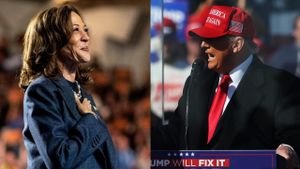Efforts from Washington to mediate the steepening conflict between Israel and Hezbollah reveal the challenging dynamics of the region. With spiraling violence on Israel's northern border, U.S. officials have acknowledged the need for immediate intervention amid fears of broader chaos involving Iran and its allies. For over a year now, U.S. officials have flagged the conflict between Israel and Hezbollah, positioned along the Lebanon-Israel border, as one of the foremost concerns for American foreign policy, even more so than the continued fighting between Israel and Hamas.
Facing the challenges of diplomacy, U.S. officials, including those from the Biden administration, are desperately seeking to stabilize the situation. The conflict has escalated dramatically, especially since Israel’s military campaign intensified against Hezbollah, stoking fears of not just humanitarian disasters but also the potential for U.S. entanglement and broader conflict.
Many analysts understand this dynamic well. Aaron David Miller, who has significant experience as a Middle East negotiator, suggested, “This is a conflict which can at best be managed or contained, not fully resolved.” The U.S. aims not to resolve the deep-seated issues once and for all, but instead to impose some level of temporary calm, or at least minimize the immediate repercussions.
Within Washington, there is hope. Some senior diplomats within the Biden administration have labeled the current Israeli offensive against Hezbollah as a rare opportunity to reshape Lebanon’s political atmosphere and reduce the influence of the militant group. They envision empowering the Lebanese Army to play a more substantial role on the border and firmly oppose Hezbollah's military presence. Enhancing the Lebanese government's authority is seen as pivotal for future stability, which the U.S. argues is necessary to avert future conflicts.
But can this vision be achieved? That’s the million-dollar question. History has not been particularly kind to U.S. efforts aimed at reshaping foreign governments. The legacy of bloodshed from conflicts such as the 1983 bombing of the U.S. Marine barracks by Hezbollah still looms large over the discussions. “The American experience in Lebanon is a tragic one,” noted Miller, emphasizing the challenges of the past. Old wounds make U.S. officials cautious as they tread down this path.
Yet the stakes are undeniably high. Amos Hochstein, the senior White House aide who has taken the lead on Lebanon, noted, “I believe a cease-fire is within reach, and it’s in the interest of both countries and people.” His words reflect the urgent need to end hostilities, but he also warned against treating the aftermath of the current conflict lightly. Hochstein suggested, “The aftermath of this conflict must be entirely different. Lebanon can be secure and prosperous and free; it's attainable but will require international community support.”
The U.S. has been working on implementing United Nations Resolution 1701, which was initially developed to secure peace after the 2006 war between Israel and Hezbollah. This resolution called for the withdrawal of Israeli troops from southern Lebanon and disarmament of all armed groups not part of the Lebanese state. Hochstein aims to reintroduce this resolution, hoping to push for improved compliance through independent monitoring by global forces, potentially incorporating the French who used to administer Lebanon prior to its independence.
Previously failed implementations have made this ambitious plan sound like wishful thinking to some. Israel claims the resolution has failed to meet its intended purpose, arguing it allowed Hezbollah to regroup and strengthen militarily. Despite the grim history, U.S. officials continue to express cautious optimism; they believe Israel's current military actions against Hezbollah, which have purportedly killed key leaders of the group and destroyed their weaponry caches, will deter Hezbollah’s capacity for attacks.
Meanwhile, the civilian cost of the conflict has surged: over one million Lebanese have been displaced due to the hostilities, prompting urgent calls for humanitarian assistance. Israel maintains its aggressive stance, proclaiming its right to defend its borders from attacks by Hezbollah, which has similarly been active, launching drone strikes against Israeli targets.
While the U.S. continuously backs Israel's military responses as legitimate, the military calculus becomes more complex with the involvement of Hezbollah. Recently, stateside opinions, including those from Biden’s officials, have begun considering the integration of external monitors and support for the Lebanese Army as feasible steps toward enforced peace within the region.
At the crux of these discussions lies the dilemma: Can the Lebanese government, embroiled in political paralysis and lacking presidential leadership for nearly two years, be trusted to enforce any potential agreements? Talking heads are raising eyebrows at the lack of any capable partners willing to stand up against Hezbollah, which operates as both military and political entity within Lebanon, sometimes holding veto powers over government decisions.
All said and done, even amid the optimism expressed by certain officials, the probability of forging significant agreement remains slim under the current political tension. Firas Maksad, senior fellow at the Middle East Institute, highlighted this gap: “A major piece of the puzzle is currently missing: a willing and capable partner.”
The intricacy of Lebanon’s internal politics also contributes to the overarching difficulty. Attempts by U.S. officials to facilitate the election of a pro-Western candidate for Lebanon’s presidency have been consistently blocked by Hezbollah supporters. “At the end of the day, anybody who doesn’t think Hezbollah is going to fight for their position has got another thing coming,” said Matthew Levitt, emphasizing the stronghold Hezbollah maintains.
All these tangled threads mean it isn’t easy to expect success anytime soon. The Biden administration may possibly find itself concluding its tenure without having managed to resolve the situation, leaving it to its successor. It’s likely the best Washington could hope for now is to mediate peace quickly enough before conditions worsen, perhaps only achieving incremental resolutions.
A week prior, Zvi Bar’el, columnist and analyst, shared his skepticism as well. Bar’el observed after several visits by Hochstein to Beirut, “I saw little sign of progress… Hezbollah and its allies are still demanding ceasefire terms concerning Gaza before they will even agree to one with Israel.”
Despite questions surrounding the effectiveness of U.S. mediation efforts, Secretary of State Antony Blinken stressed there’s been “good progress” being made toward implementing Resolution 1701 adequately. Still, the road forward remains challenging, with increments of hope increasingly contrasted against the backdrop of shifting regional dynamics.
Through this convoluted situation, the U.S. finds itself at the epicenter of various crises — Lebanon, Gaza, and the broader Iranian conflict. The cause may not be lost, but the stakes remain alarmingly high.



